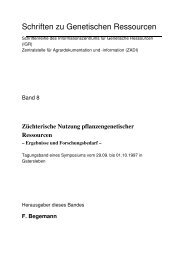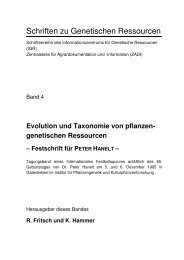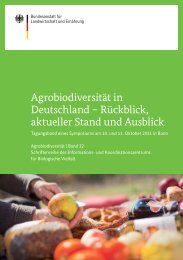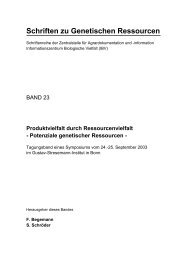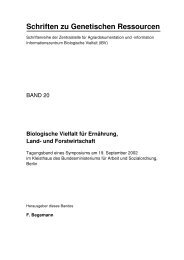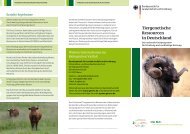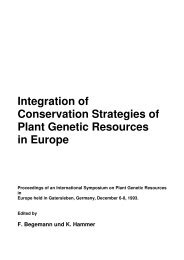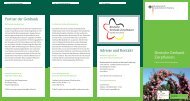Zugang zu Pflanzengenetischen Ressourcen für die ... - Genres
Zugang zu Pflanzengenetischen Ressourcen für die ... - Genres
Zugang zu Pflanzengenetischen Ressourcen für die ... - Genres
Sie wollen auch ein ePaper? Erhöhen Sie die Reichweite Ihrer Titel.
YUMPU macht aus Druck-PDFs automatisch weboptimierte ePaper, die Google liebt.
Survey of property rights and conditions of access to genetic resources on the international level<br />
or through umbrella agreements to be negotiated with regular recipients of center material. These<br />
conditions would have to be agreed with countries supplying germplasm to a center. Key<br />
conditions of the arrangements with supply countries would be that a center (i) accepts material<br />
on standard conditions which would allow its free use for research within and outside the center;<br />
(ii) discloses information on distribution of material to third party users; and (iii) requires a user<br />
to acknowledge the possible rights of the supply country to compensation and deal with the<br />
country directly, but the center will not act as collection agent for the supply country.<br />
6.2 Material Currently Held in Genebanks<br />
Material currently held in genebanks and thus excluded from the scope of the Biodiversity<br />
Convention may well represent the most imposant part of the world`s surviving plant germplasm.<br />
In the upcoming negotiations over whether and how it should be brought under international<br />
control, the countries holding the germplasm will have awesome negotiating clout. In order to<br />
facilitate global research, they should use it to negotiate an understanding that guarantees as free<br />
and unencumbered an exchange of germplasm as possible.<br />
To accomplish this, they may want to do several things: They should open these negotiations at<br />
the technical rather than the political level. It would seem much easier to reach agreement at the<br />
level of genebank curators than with the political representatives of some developing countries.<br />
Such discussions would precede the political negotiations, and could take place in a preparatory<br />
working group to be set up for this purpose in FAO. In addition, public genebanks in industrial<br />
countries should form alliances and establish exchange networks with their own exchange and<br />
release rules. Developing country genebanks may want to join. The prospect of their sharing<br />
technical know-how in storage techniques and database management should make it attractive for<br />
them to do so. These networks could eventually be integrated into FAO's network of ex situ<br />
collections which to date solely the CGIAR centers have joined.<br />
6.3 Farmers' Rights<br />
The industrial world has remained consistently aloof to the farmers' rights concept although<br />
appears so clearly grounded in equity consideration. This is regrettable because the exchange of<br />
germplasm could well be one area in which some developing countries could trade a service for<br />
compensation, and to that extent become less dependent on aid.<br />
Attempts to design farmers' rights as an intellectual property right which has been the legal<br />
construct underlying the debates in FAO have not been helpful. For one, intellectual property<br />
rights are individual rights. Conceivably, they could be vested with a community. However,<br />
questions of who is to defend them (more critical for the maintenance of intellectual property than<br />
for real property) and who is to share in the spoils when compensation arises, make their<br />
implementation difficult. Under the proposal currently debated in the Indian parliament a complex



